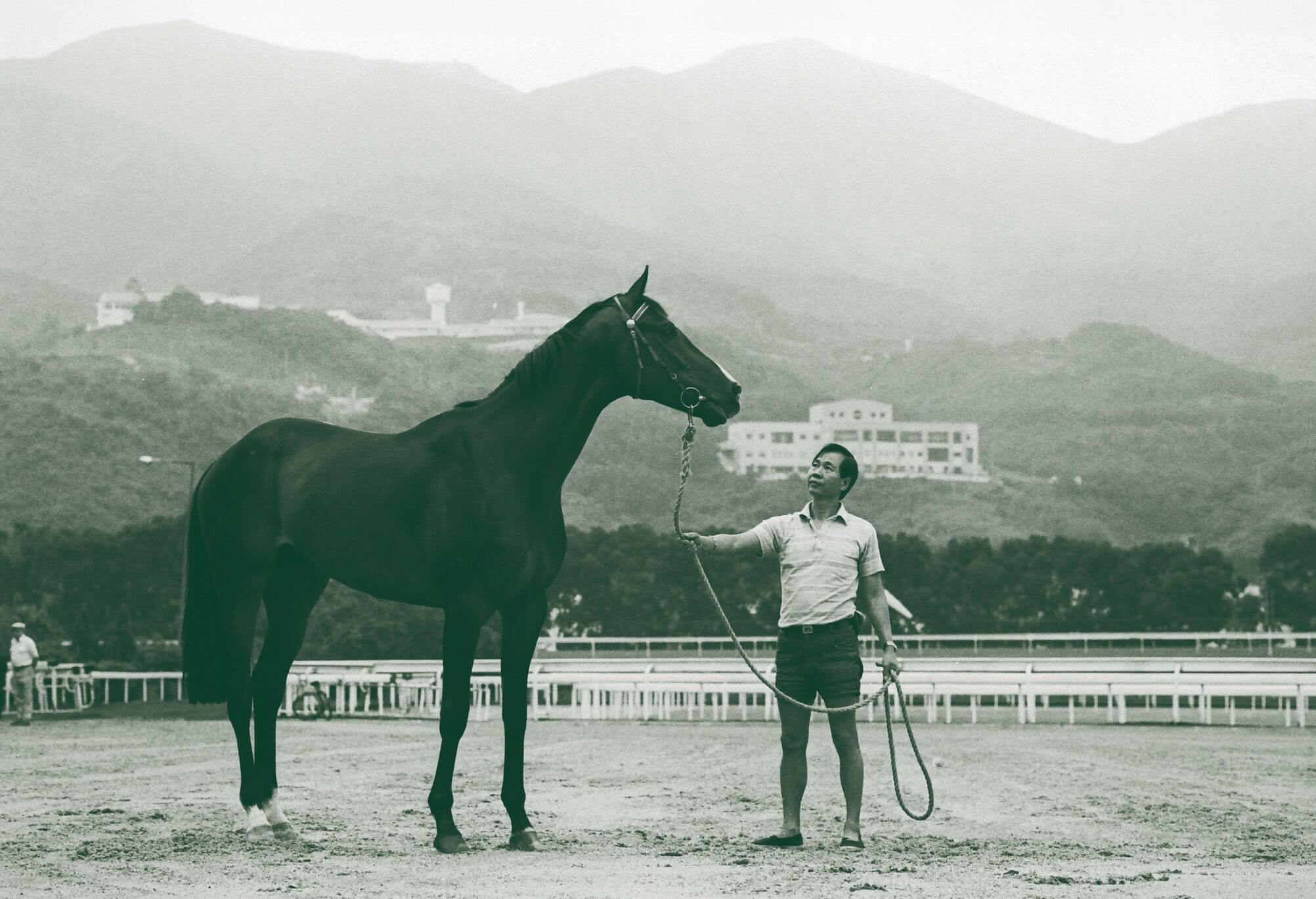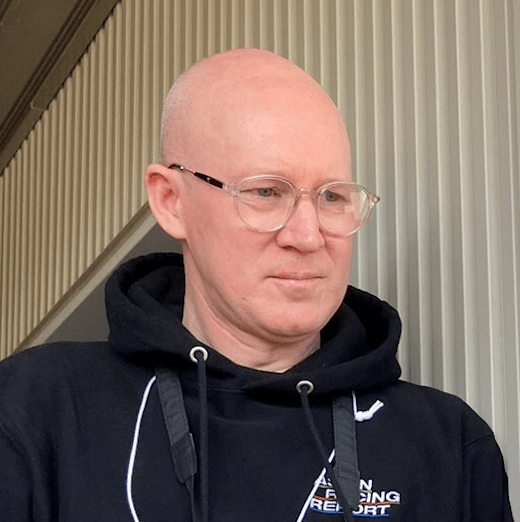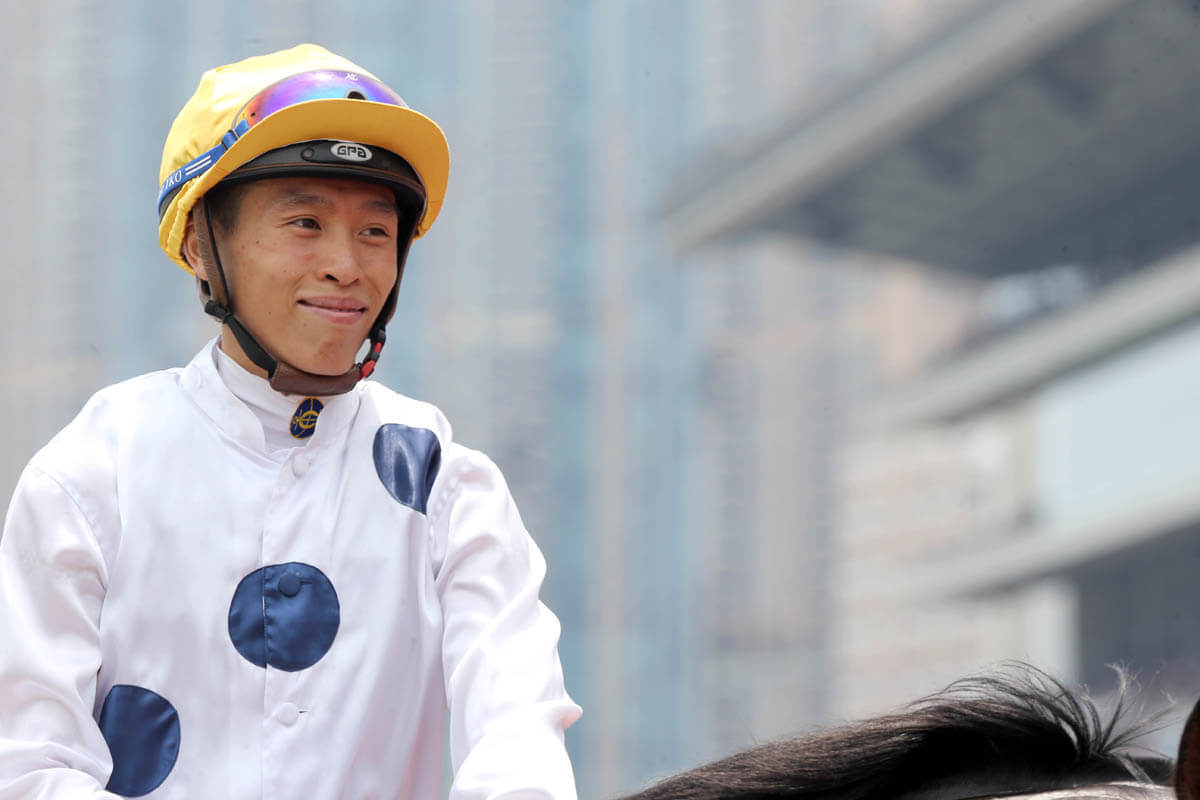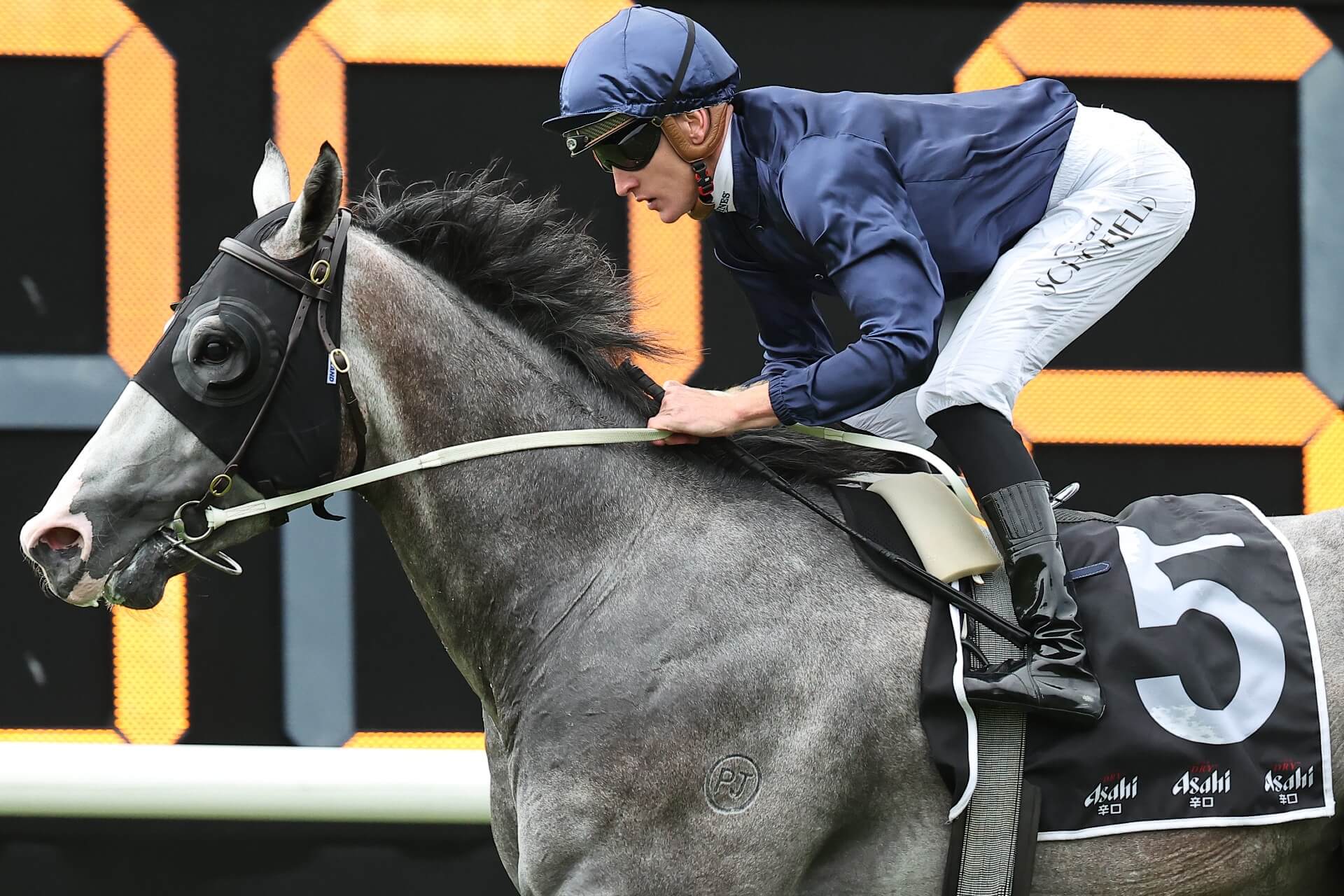Origin Story: Hong Kong Racing’s First Raider
Before Romantic Warrior, before Silent Witness, before Fairy King Prawn, there was River Verdon.
Boyz II Men were all over the radio at the time River Verdon landed on the runway at Chicago’s O’Hare International Airport. It was the last days of summer 1992 and the group’s heartbreak ballad End Of The Road was part-way through a 13-week stretch at the top of America’s Billboard Hot 100.
Local residents didn’t need to have their ghetto blaster tuned to B96 ‘Killer Bee’ station’s top 40 to hear it either: the song was everywhere. There seemed to be no way of escaping those Philadelphia boys’ four-way ‘hip-hop-doo-wop’.
While Boyz II Men dominated the airwaves, the lucky kids of those post-Cold War days played Nintendo’s new Mario Kart sensation, George Bush Sr.’s days in the White House were numbered, John Major was settled inside 10 Downing Street, and Chris Patten was a month or two into his spell as Hong Kong’s last British governor.
British governance over Hong Kong was indeed approaching the end of the road. But, for Hong Kong horse racing, the road to offshore international competition lay before it as an uncharted strip of virgin ground and River Verdon was the trailblazer.
“He was the first horse in Hong Kong to travel abroad for a big race and I think it was a good experiment,” says the gelding’s retired trainer David Hill, speaking by phone from his home in Houston, Texas.
It was an experiment that would pave the way for famous overseas conquests by the likes of Fairy King Prawn, Vengeance Of Rain, Silent Witness, Cape Of Good Hope, Rich Tapestry, Romantic Warrior and more, as well as brave near misses and deflating flops.

Hill reflects modestly on his role in guiding the original Hong Kong raider: “Whether it was a legacy or not, I don’t know, I was just told to do something and I did it.”
Joint-owners Sir Oswald Cheung, “a wonderful gentleman,” he recalls fondly, and Ronald Arculli had informed Hill and jockey Basil Marcus shortly after the close of the 1991-92 season that Hong Kong’s standout horse had been invited to the Arlington race, with its big prize and global prestige. But there was also a persuasive influence in the background.
Major General Guy Watkins had headed the Royal Hong Kong Jockey Club for about six years, and, having overseen the advent of overseas runners descending on Sha Tin for the Hong Kong International Races each December, he was keen to see what Hong Kong’s horses could do on foreign shores.
Travelling a horse abroad in 1992 was not what it is now though. Sure, Arlington had international stables for the European contenders, but they had never had a horse from Hong Kong: no one had.
“They treated us very well, don’t get me wrong,” Hill says. “The vets were there every day to check on him, and they gave me special times for me to take him out onto the track and things like that.
“But the facilities they gave us, well, it was more like a tent. They put up this wooden structure inside this tent about 500 metres away from the international stables, for quarantine reasons. The tent, I suppose, was to keep the rain off, but it was a wooden structure built purposely for him.”
Rudimentary stabling aside, it was hoped that the expedition would be an informative one, and a valuable comparison exercise.
River Verdon faced a field of rivals that featured the previous year’s winner Golden Pheasant – successful in the Japan Cup in the interim – Canada’s turf star Sky Classic, the top-class Europeans Second Set and Exit To Nowhere, and Quest For Fame, winner of the Derby in England two years prior and a G1 winner in the US since his transfer across the Atlantic.

River Verdon was there thanks to his great superiority in Hong Kong. He had won all six races in his Hong Kong Derby-winning campaign of 1990-91; in 1991-92 he won December’s Hong Kong Invitational Cup, the Hong Kong Gold Cup, Queen Elizabeth II Cup, and Champions & Chater Cup, while three losses came at distances short of his optimum.
The Hong Kong team arrived about a week out from the September 6 race date.
“I walked the course and it was very tight,” Marcus recalls. “It wasn’t ideal for the way River Verdon liked to race: he loved to jump out, relax, settle. He won a lot of his races from the back of the field and he would gain his momentum through the run, then just before the straight we’d angle him out and he’d really collect himself and finish the race off exceptionally well.”
That wasn’t going to work at Arlington and it was decided to race handier. But first they needed to get him into the gate.
“He was a lovely, kind horse as well as being a wonderful athlete, but he had a serious quirk about going into the starting stalls,” says Marcus, who would go to Hill’s Sha Tin stables of an afternoon to practise getting River Verdon into a stall.
“I had to be at a particular angle. I used to go to the side of the starting stalls and then run him in and you had to get him spot on. We couldn’t take that chance going into this race, so I practised and practised.”
Meanwhile, Hill persuaded the Arlington starter to let them enter the stalls first without being led by a handler as was the usual way in the US.
When it came to the crunch, River Verdon entered his stall, broke well, raced handily along the rail, but then faded out to place 11th of 12 behind the French victor Dear Doctor.
“I think River Verdon was the wrong horse to try it with,” says Hill, noting that the timing of the race, coming off the Hong Kong close season without a prep, did not help matters, nor did the solitary nature of his stabling.
“I don’t think he was at his best when he went to Chicago. Plus, everything went wrong for him in the race: he jumped brilliantly out of the gates and Basil just sat him close-up and he never really relaxed, he was pulling. Well, he’d not had a race beforehand to help him settle.
“I’m not saying he would have won (if at his best) but I’d have thought he would have run in the first four or five.”
The Hong Kong contingent on-track pumped the best part of US$41,893 into the Arlington Million’s US$512,849 win pool for River Verdon to open up as the 3-1 second-favourite, easing out to about 10-1 at off-time but still a long way shorter than expected.
Arlington did not end in glory nor riches, but it did give Hong Kong’s horsemen a sense that their best gallopers were not far off the world’s cream. Two years later, Hill was preparing River Verdon for an Australian expedition that would take in the Cox Plate and the Melbourne Cup.
“He was in a shipping container with a tiny little paddock that wasn’t more than stable size.”
This time a four-runner 2300m race was arranged at Sha Tin on the first day of the season: he won easily, but the seven-year-old finished down the field in both of his Australian races.
There was no wooden stall in a tent at Sandown racecourse, where River Verdon was stabled for his two races, but the accommodation wouldn’t have been decked with stars on Tripadvisor either.
“He was in a shipping container with a tiny little paddock he could go out in that wasn’t more than stable size,” Hill remembers. “The only thing great about that was that I had the whole of Sandown racecourse to myself, so I could do anything I wanted with him in the mornings. But the stabling was poor.”
Again, the races weren’t run to suit River Verdon: he was back in the field in a crawl-and-sprint race at Moonee Valley; then jockey John Marshall did not want a repeat of that in the Melbourne Cup so opted to box seat, but that wasn’t the old champion’s style.
“He was just a shell of himself by that time, but what to do? You do what you’re told,” says Hill. “His old legs were starting to give out, his suspensory was starting to give him a bit of trouble and he was definitely past his best.”
River Verdon’s time at the top was past, but he had heralded a new dawn.

In 1991 the old way of the Royal Hong Kong Jockey Club buying horses and allocating them to its owners via a ballot ended. This major change enabled for the first time those wealthy owners with deep pockets to source high-class overseas imports.
Into this new system stepped trainer Ivan Allan, arrived from Singapore, to take up the baton. Within six years of River Verdon’s Arlington experiment, Allan’s horses were showing the world that Hong Kong’s runners were to be respected.
In 1998 he sent owner Larry Yung’s Oriental Express to Japan to contest the Yasuda Kinen. The grey came up against Japan’s champion miler Taiki Shuttle and placed a close second. Taiki Shuttle then went to Deauville, France for a famous win in the G1 Prix Jacques le Marois.
A year later, Allan tested Indigenous at Ascot: he was sixth behind Daylami in Europe’s great summer showpiece, the G1 King George VI and Queen Elizabeth Stakes; then to Japan in the autumn and second place behind the Japanese hero Special Week in the G1 Japan Cup, defeating heavyweight Europeans Montjeu and High-Rise. Hong Kong horses were turning heads.
“There wasn’t much confidence before we went to Japan and England, it was more about going there, being vulnerable and taking a good horse out of the comfort zone and seeing what he could do,” recalls Douglas Whyte, who rode both horses in Japan but missed the Ascot race due to an emergency appendectomy the day of the race.
“I think owners and trainers started to get confidence,” he notes. “It’s like if that person can do it then why can’t we. Ivan going and showing the horses were competitive, it started having a snowball effect, it opened windows to opportunities.”
The big breakthrough came when Allan’s Fairy King Prawn went to Tokyo in June 2000 and won the G1 Yasuda Kinen. Then along came Tony Cruz-trained Silent Witness, the horse Hong Kong needed to grab global attention. The great galloper did that with 17 straight wins and then victory in the G1 Sprinters Stakes in Japan.


David Oughton’s talented sprinter Cape Of Good Hope raced away from home to avoid ‘the great one,’ winning the G1 Australia Stakes and the 2005 G1 Golden Jubilee Stakes at Royal Ascot. Then came a G1 Dubai Sheema Classic win for David Ferraris’s Vengeance Of Rain and Ricky Yiu’s Ultra Fantasy notched a Sprinters Stakes.
By the 2010s the best from Hong Kong were expected to be competitive overseas. That decade brought 19 notable offshore wins, and 11 of those came between May 2013 and May 2015.
That included the 15-month golden spell from Rich Tapestry’s March 2014 win at Meydan, through to one night at Kranji in May 2015 when Dan Excel and Aerovelocity bagged Singapore’s two majors: during that time, Hong Kong horses won nine overseas Pattern races including two at the Dubai World Cup meeting of 2014.
That zenith of the city’s overseas exploits was spearheaded by a Moore stable at its peak.
“In the early days it took us a while to get the right people in with experience to travel the horses, and do the right job of how to travel horses,” says Moore, whose breakthrough overseas win came with Military Attack in the 2013 Singapore International Cup. “By that time, we weren’t afraid to travel.”
Since River Verdon flew to Chicago, Hong Kong horses have raced away from home 280 times in 10 different countries (excluding trips to Macau). They’ve won 31 races, placed second 24 times and third 33 times: that’s a win percentage of 10 percent and a top-three rate of 31 percent.
The raids lessened after Able Friend’s high-profile defeat at Ascot in 2015, and stopped altogether during Covid shut down. But the appetite for travel was back post-Covid: middle-distance champion Romantic Warrior bagged the Cox Plate in the Melbourne spring of 2023 and the Yasuda Kinen the following June, and in March 2024, California Spangle took the G1 Al Quoz Sprint in Dubai.
River Verdon took the first steps on the international road and in the current World Pool age, that road’s end is nowhere in sight.





